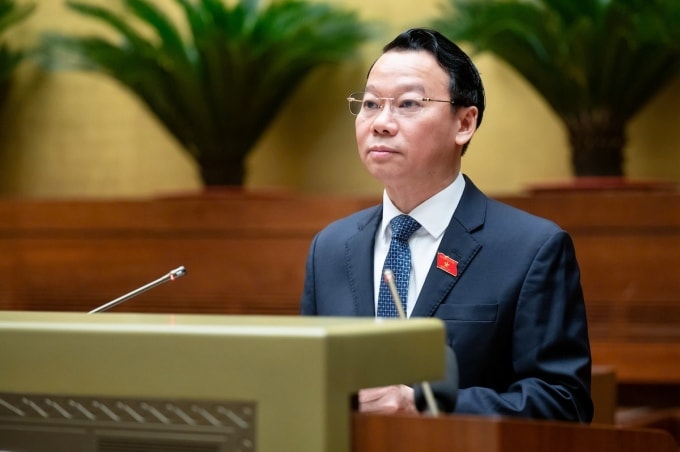To increase market supply, the Government proposed a pilot program for investors to negotiate the right to use agricultural and non-agricultural land for commercial housing for 5 years.

On the morning of November 13, authorized by the Prime Minister, Minister of Natural Resources and Environment Do Duc Duy presented a draft resolution of the National Assembly on piloting the expansion of land for commercial housing projects through agreements.
According to the Housing Law 2014, from July 1, 2015, investors are only allowed to carry out commercial housing projects when they have the right to use residential land. This is different from the Land Law.
The Government believes that this mechanism limits the implementation of commercial housing projects under the urban area scale, especially in new areas without residential land.
In fact, the maximum land allocation limit for households and individuals is 400 m2, the rest is agricultural land in the same plot. Therefore, investors cannot transfer land use rights in residential areas to do commercial housing projects. Not to mention, most real estate projects are implemented on land that was not originally residential land and includes many different types such as traffic land, green trees, etc.
Therefore, to remove obstacles and increase supply for the real estate market, the Government proposes that investors negotiate to receive the right to use agricultural land, non-agricultural land that is not residential land, and other land in the same plot to build commercial housing projects. This policy is proposed to be piloted for 5 years.
The selected pilot project must be implemented in an urban area, not part of a project that must be recovered. The pilot project must have a maximum of 30% of additional residential land area during the planning period (compared to the current land use status) according to the land allocation and zoning plan of the provincial planning until 2030.
The provincial People's Committee will consider and grant licenses to real estate business organizations to receive land use rights transfers. Along with that, real estate business enterprises must meet the conditions on land, housing law, real estate business, and investment.
In case the investor receives the transfer of land use rights with origin as national defense and security land, written approval from the Ministry of National Defense and the Ministry of Public Security is required.
This pilot, according to the Government, is a step to remove difficulties in the supply of real estate projects in the context of high prices due partly to difficulties in accessing land.
Examining the draft resolution, Chairman of the Economic Committee Vu Hong Thanh mentioned many opinions at this agency that the regulations on land types to be piloted are too broad, including rice-growing land, forest land (special-use forests, protection forests, production forests), land used for national defense and security purposes...
The inspection agency noted that it is necessary to strictly control the conversion of land use purposes for rice fields, special-use forests, protective forests, national defense forests, and security lands with large areas. This will affect environmental protection, food security, and national defense security.
According to Mr. Thanh, there are concerns that allowing agreements to receive land use rights other than residential land for commercial housing projects will lead to price fever for agricultural land and other types of land. This could cause many difficulties for people and businesses, as well as the State when it needs to reclaim and compensate for land.
Therefore, the Economic Committee recommends that the Government review and clarify the application of the pilot mechanism through agreements on receiving the right to use or having the right to use agricultural and non-agricultural land (commercial and service).
This is to avoid policy abuse, legalization of existing problems, even violations (if any) or creating a trend of buying and speculating on agricultural and non-agricultural land for commercial housing projects.
In addition, this agency proposed to clarify the implementation principles in cases where there are many pilot projects proposed, especially in Hanoi and Ho Chi Minh City - where many real estate projects are stuck. There are opinions suggesting not to stipulate this criterion to avoid arising procedures or creating a "request - grant" mechanism.
According to the program, today the National Assembly will discuss this content in groups, at the hall on November 21 and pass it at the end of the session.
TB (according to VnExpress)